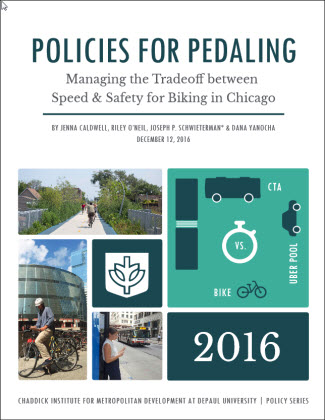
A report from DePaul University’s Chaddick Institute for Metropolitan Development looks at bicycling policies to help promote and manage the growth of biking as a means of transportation in the city, and to better understand their potential effects on the speed, convenience, and predictability of bicycle travel in the City of Chicago.
Based on a review of municipal ordinances from around Illinois and field observations of 875 cyclists at six intersections in Chicago, the study makes policy recommendations for municipalities interested in supporting bike travel by encouraging ridership and safety on the road. Recommendations include:
- Considering permitting “Idaho Stops” at four-way stop intersections, which would enable cyclists to determine whether to stop or yield based on traffic conditions in order to maintain their momentum. The study shows that only about one cyclist in 25 presently complies with the law to come to a complete stop. A pilot program to allow Idaho Stops at certain traffic signal intersections when traffic volumes are relatively low may also be considered.
- Lowering fines for cyclists who commit minor traffic violations and offering “diversion programs” as an alternative to paying a fine if the cyclist attends an approved traffic safety class. Such programs present a unique opportunity to educate cyclists about traffic laws and how they are enforced.
- Prioritizing incremental, low-cost infrastructure improvements, such as signage, along routes that connect neighborhoods outside of downtown. In the absence of a designated bike lane, these efforts both encourage drivers to share the road and justify cyclists riding in traffic.